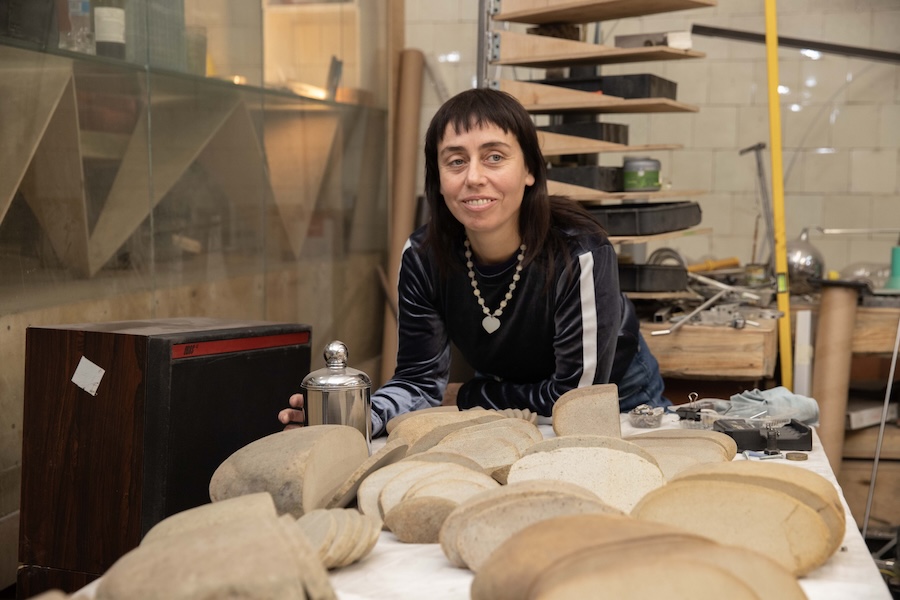
Amid turmoil and chaos, the power of art emerges as a vital testament to human resilience and creativity. Today, we delve into the life and work of Zhanna Kadyrova, an award-winning contemporary Ukrainian artist whose innovative use of found objects in sculpture, photography, and site-specific projects speaks volumes about her experiences and the state of her homeland.

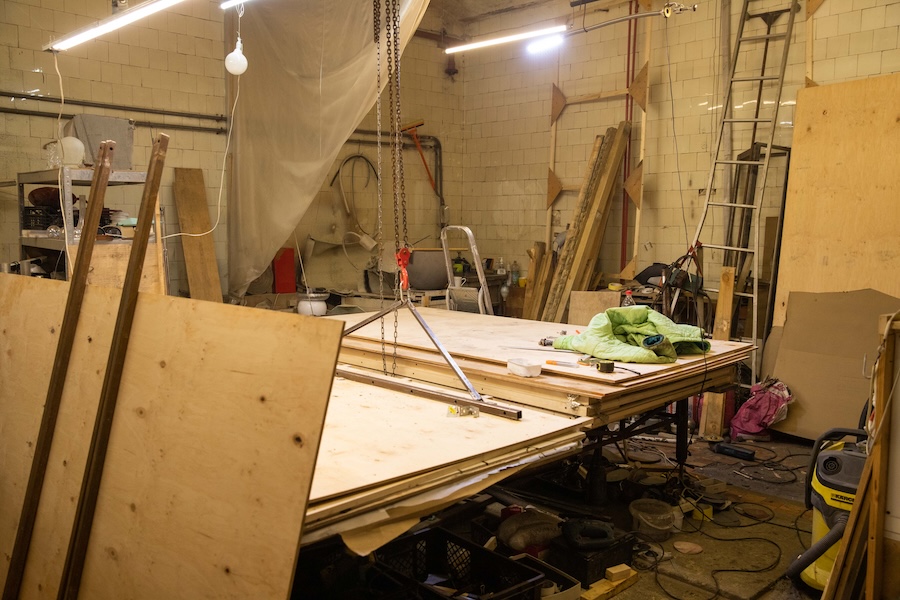
Born in Brovary in 1981 and a current resident of Kyiv, Kadyrova has not only weathered the storm of the Russian invasion since February 2022 but has also transformed her challenges into profound artistic expressions. Through her journey from childhood memories marked by displacement to her ongoing exploration of identity and struggle, Kadyrova embodies the spirit of a nation in crisis. Join us as we explore her thoughts on the intersection of art, politics, and the enduring strength of the Ukrainian people in these challenging times.”
Follow Zhanna Kadyrova @jannkad / www.kadyrova.com
An interview by Sofia Tchkonia @sofiatchkonia / www.sofiatchkonia.com
All photos by Sasha Mazur @mazur_sasha
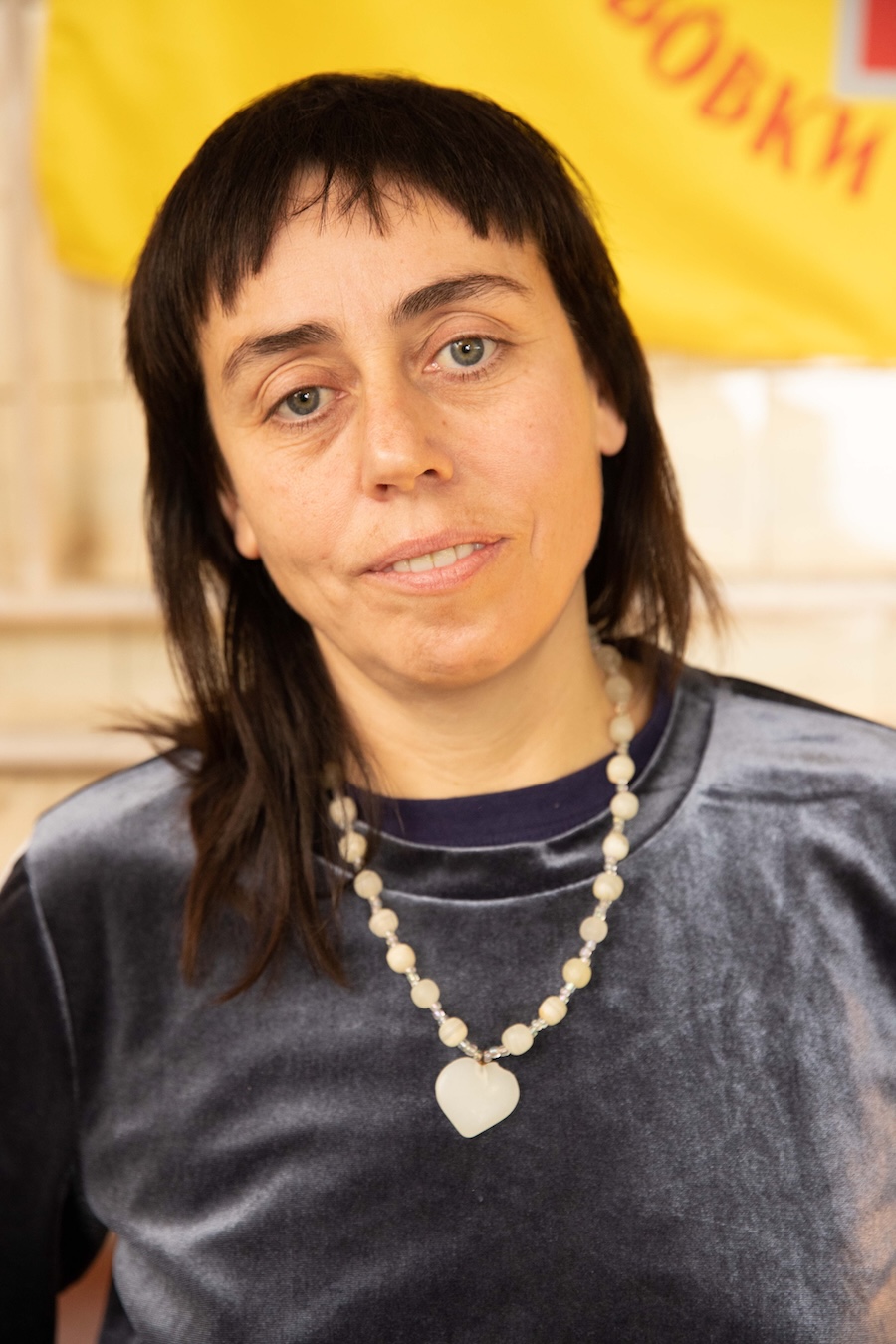
Zhanna: I am Zhanna Kadyrova, a Ukrainian artist, living and working in Kyiv.
Sofia: From what age do you remember yourself?
Zh: I remember myself from the age of 5, very fragmentarily.
S: What were your first memories of childhood?
Zh: I remember that I was taken out of Kyiv because the Chernobyl nuclear power plant exploded.
S: And how was that?
Zh: I mostly remember the place I was taken to. It was the Urals, because my father is from the Urals, Bashkortostan. I also remember spending time outside the city in the summer, in a village in the Chernihiv region.
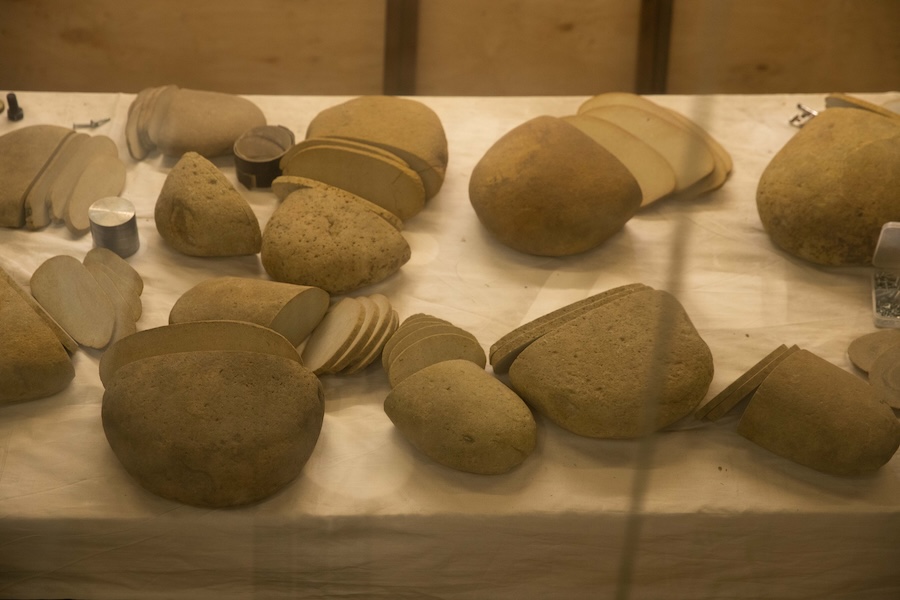

S: How was your childhood?
Zh: Since the 5th grade, I have lived in a dormitory; I was studying at an art school in Kyiv, and since I was born in Brovary, I could live in a dormitory. I started living independently quite early, at the age of 11. I felt perfectly fine in this situation.
S: How did art come into your life?
Zh: My father is an artist. A few weeks ago, his panel in the “embossing” technique was removed from the Brovary Main Post Office, and after a scandal, I managed to take this work — a metal panel 3.5 meters long. My father programmed my sister and me from childhood to become artists. When my mom took my sister to violin lessons, he said, “Why are you torturing the child? They will be artists.” And here’s the result.
S: Do you remember your first painting?
Zh: No. My mom showed me some saved childhood drawings, but what can I remember about them… I probably drew about 20 a day, like all children.
S: How did you study?
Zh: Well, in this school. My father first prepared me because to get in, I had to pass exams: drawing, composition, and sculpture. We decided that the competition would be less in sculpture, so I would go into sculpture, and my older sister was already in the sculpture department, so I automatically followed her. I think at 11, people aren’t yet ready to choose something for their lives. Everything just fell into place for me.
S: Who was the first artist or artwork that inspired you?
Zh: To be honest, it’s very difficult for me to talk about “firsts.” I feel like I was born again on February 24th. Everything before that is so blurred that I don’t remember what happened 3 years ago: I get confused with dates, can’t remember the names of curators I’ve worked with recently, so the first artist… It’s been so long, it’s hard to say. Along with school, I had a good teacher, and I went to him to study sculpture. His name was Gennady Khusid, and he gave private lessons. He had a drawing course, and there were many people, but in sculpture, I was the only one. I liked it: 3 hours, 3 times a week, I went to extra lessons, sat in this basement with mouldy skulls, and I loved it. Essentially, this person opened my eyes to some classical things, particularly the understanding of Greek sculpture. Thanks to meeting this teacher, I understood the liveliness of this sculpture, which we drew in school lessons. Everything I know about composition is from him. School was about practice, friends, socialisation, and a free life outside the parental home. After that, I began travelling, visiting museums. I can’t recall exactly what impressed me. I don’t stick to any specific guidelines. I never had a favourite artist. I like many things from different eras.

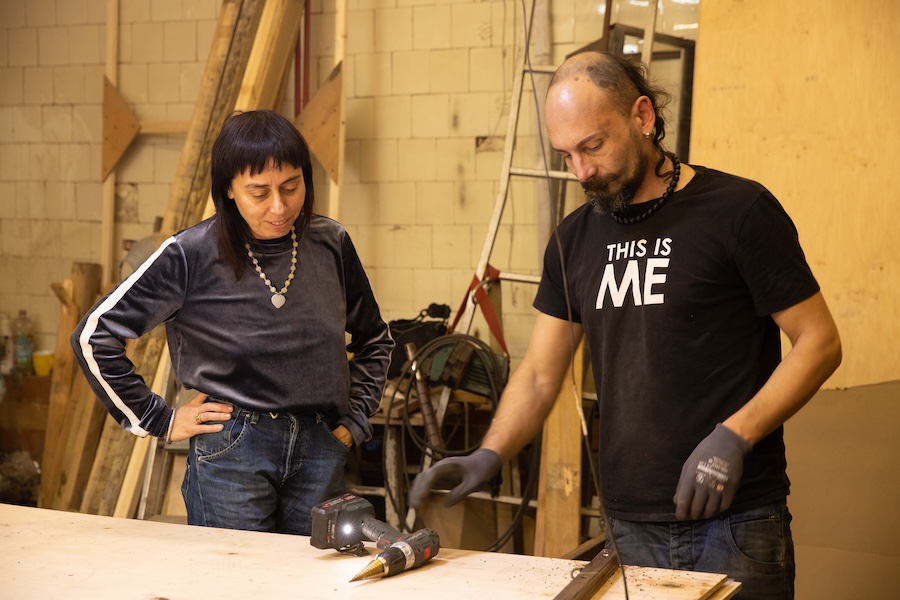
S: You say your life was divided into “before” and “after” the invasion of Ukraine. How do you remember the day when it all began?
Zh: I had friends visiting, as usual. I live in a private house, and we used to stay up until midnight. It was just another evening. I had just returned from Berlin a couple of days ago. Around 1 or 2 in the morning, my friends left, we said goodbye, I went to sleep, and at 4 AM, I woke up to explosions. That’s how it all began. I immediately understood what happened because I had a premonition that a full-scale war would start, and I even rushed to return from Berlin so that, God forbid, it wouldn’t start without me. My mind blocked the information, and in the first few days, we all thought it would end soon, that this couldn’t be happening.
S: What was your first reaction?
Zh: My first reaction was to bring my mom, who lives in Brovary, to my place, to my private house, because she lives on the 12th floor, and if serious shelling begins, and the water and electricity are cut off, my private house at least allows me to draw water from the well and heat with firewood. My mom came on the second day.
S: Very often, artists stay out of politics. How do you feel about that? Should they participate in what’s happening in the country or stay away and focus on their work?
Zh: I want to say that artists don’t owe anyone anything. For a space to function properly, there should be both kinds of art: formal, sociopolitical art practices and amateur ones. That way, it’s a full society, not a totalitarian one where only one kind of art is allowed, and nothing else. As for my subjective experience, I create art that relates to politics. We made an agreement with the gallery and imposed a moratorium on the sale of my works created before 2022, so we could focus on the events happening right now. What I do is political, and I can’t do it any other way. What others do — let them do it, as long as they’re doing something, because I know many artists, my friends, who simply can’t work after the full-scale invasion began: they just can’t be fulfilled. This is my subjective experience. I think it’s unethical to tell others what to do.
S: Since the war began, there has been a lot of interest in Ukraine, its artists, and art. Is that interest fading now?
Zh: The interest in the Ukrainian cultural field increased after the full-scale invasion. This applies not only to artists but also to musicians. In the beginning, many were invited to festivals, exhibitions were organised by both foreign and Ukrainian organisers, and Ukrainian curators were invited to showcase Ukrainian artists. There was a lot of interest in this direction. I think interest began to decline somewhere in the spring of this year.
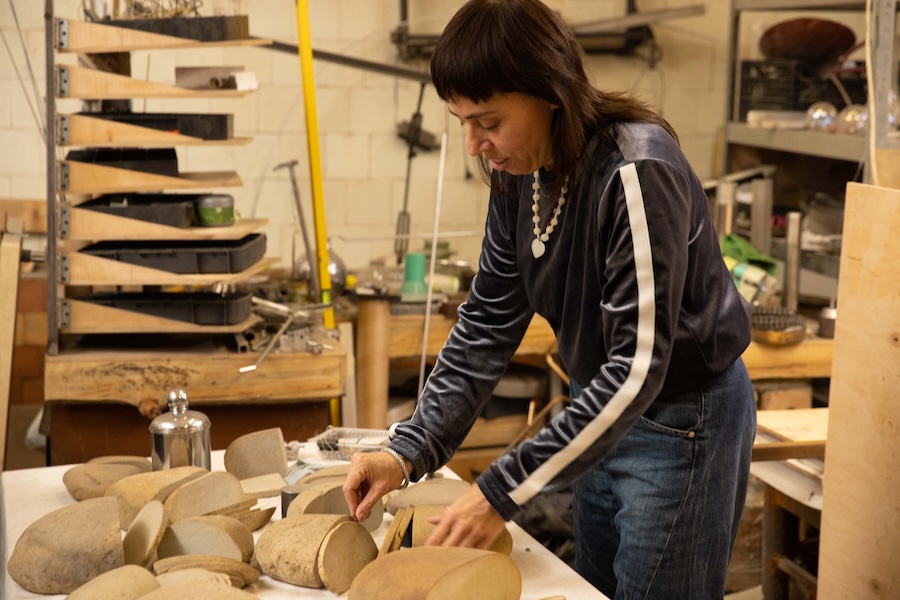
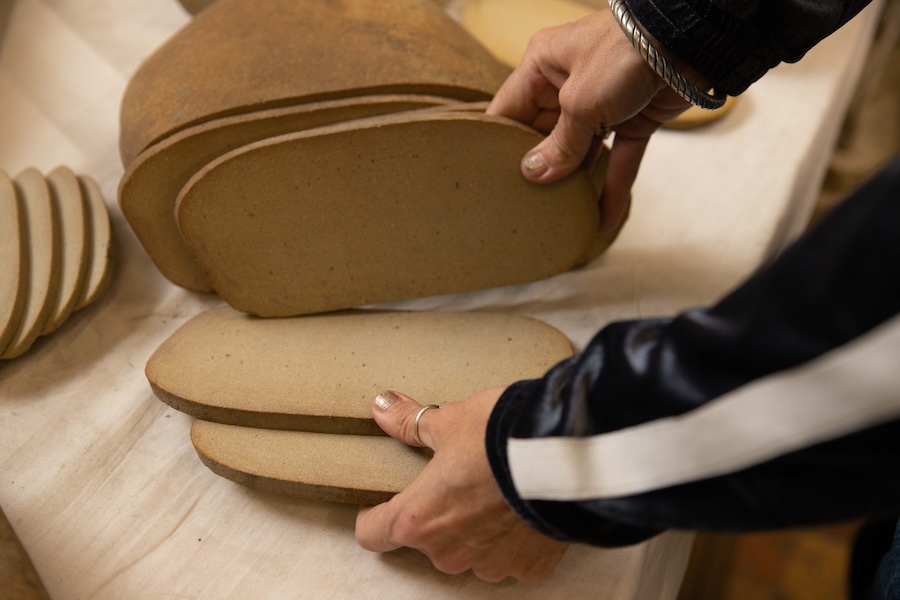
S: Why?
Zh: Everyone got tired. Everyone wants to live a normal life. People are fed up.
S: How do you feel about that?
Zh: Like a river flowing. How can I feel about it? It’s a normal natural process. Everyone wants to live a normal life. The few people who are still helping us, I am immensely grateful to them. They still find the strength to help us. As for those who stopped helping or helped in the beginning and now want to forget about it and peacefully drink a cocktail at a bar — that’s also completely normal.
S: Do you think you are a sufficiently recognised artist in the world?
Zh: My artistic activity has been going on for over 20 years. During this period, I have been working for over 10 years with one of the largest galleries in the world. As for evaluating my activity, if I can do what I want, and if I have the resources to do so, then everything is good. At the moment, I have everything I need to work: not only to produce but also to showcase my work. There are a lot of exhibitions.
S: Where and to whom would you most like to show your works?
Zh: I don’t think about such things at all. Usually, I get invited. I don’t look for places to exhibit or which grant to apply for (I’ve never filled out a grant application in my life). I am usually invited: either a curator or an institution contacts me and proposes a project, group or solo, depending on the situation. Based on whether the institution is good and whether the curator is good, I agree or not. But in the last two years, with the “Palyanytsia” project, I agreed to almost all exhibitions, 99%, I don’t filter them, because I believe that any manifestation of Ukrainian art in the world is a political act, and I take part in it so that Ukraine is seen. And since the “Palyanytsia” project is a humanitarian project, a chance to sell this stone bread to raise money for the army’s needs. First and foremost, for my friends who are on the front lines protecting us, for friends in the art community, and musicians.
S: How did the idea for this project come about, and why stone bread?
Zh: The idea for this project came because I lived as an internally displaced person for 3 months. On the 9th day, we left Kyiv. The first task was to take my mom and my sister, who is also elderly, to safety. They went to Germany. We drove in two cars toward the border, and Denis, who is both my co-author and the technical director of my production, and I decided not to leave Ukraine and instead looked for housing in Western Ukraine, in a safer region. This was also not easy, as all the hotels and cottages were booked a month ahead.
After living 5 days in a hotel, we eventually found a house that could serve both as a living space and a workshop. The hotel didn’t allow us to work. Once my mom was safely abroad, we began thinking about what we could make to help and organise some assistance. Of course, we didn’t take any tools from the studio. We only took basic things: a computer, documents, since we thought we might have to walk 8 km because, at that time, taxis wouldn’t take us, our cars were on the Right Bank, and we lived on the Left. We planned to walk across the North Bridge. The idea was that we were looking for a place to work and live, and this house was available only because there was no electricity: a tree had fallen and severed the wires. We made an agreement with the owners, gave them money for a cable, and the next day, they restored the electricity. T
In the first days, we cooked with firewood. Later, we got a fridge, an electric stove, bought some things, set up the internet, and arranged our living space. The “Palyanytsia” project came about because there was a mountain stream near the village, and on the riverbank, we found smooth stones. While walking there, we found a stone that resembled bread and decided that it was “palyanytsia.” At that moment, in the first month of the war, the word “palyanytsia” was used as a password to identify Russian saboteurs, as they couldn’t pronounce it correctly. This word became mythologised as a password, a symbol of our resilience. We took the stone, bought an angle grinder at the nearest hardware store, got a stone disc, and started cutting to see how it would look. And we cut it. Currently, there have already been more than 40 exhibitions worldwide with this project.
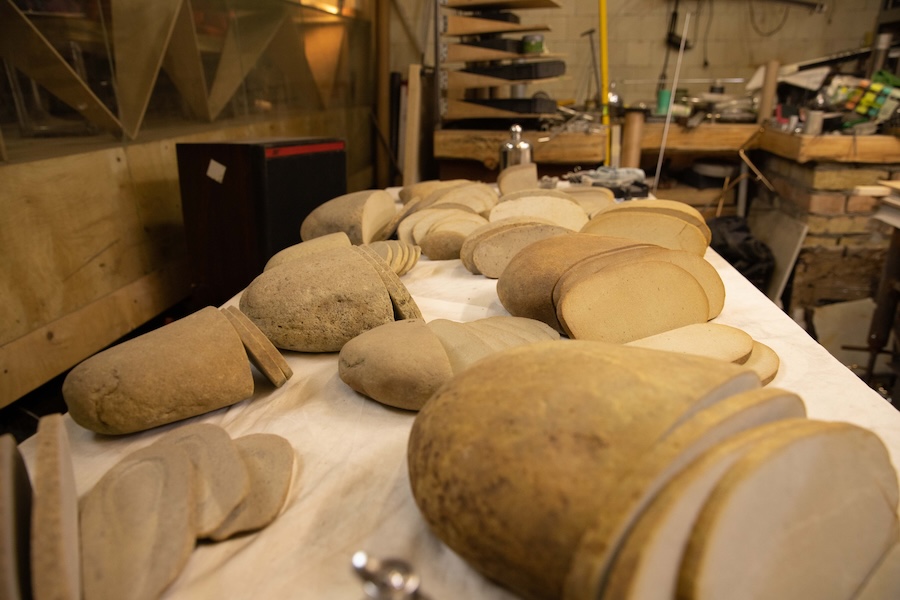
S: What traits of character have you discovered in Ukrainians since the war began?
Zh: There were a lot of different emotions at the beginning. I was very disappointed in my choice of profession. I was upset that I was an artist. It seemed to me that it was the most useless profession. That art is powerless against tanks. I thought that all these 20 years of my creative work were a dream, and now I had finally woken up to reality. But then, gradually, when this project began bringing in money, my opinion changed. I became more optimistic, realising that we are not doing all this in vain. What surprised me was how people adapt to everything. This is a characteristic trait, probably genetically ingrained, that you either adapt to or die. The level of adaptation that Ukrainian society is going through, especially those who stayed in Kyiv, and some who stayed in Kherson, or even closer, in Boryslav, Mykolaiv, Bakhmut — these people… this is human adaptation. What amazed me is that people adapt to everything and continue to exist as a human species. I could never have imagined that this was something we could adapt to. But it turns out, we can.
S: Your opinion as a Ukrainian, as a person, what would you say to the world that is tired of war? And yet, you all continue to live and fight, in the centre of Europe, in a state of war.
Zh: First of all, what is happening in Ukraine is a humanitarian catastrophe. The fact that this is happening in the 21st century is a loss for all of humanity and all the ideals that humanity has built as a civilisation. It’s the collapse of civilisation, civility, and the civilised path. At the same time, some people are opening exhibitions, sitting in philharmonics, feeling like cultural people, while, at the same time, women are being raped and newborns are being killed by rockets. What is happening at the front, on both sides, is terrible violence. It’s a loss of self. Unfortunately, in the end, what won was some mutually beneficial resource arrangement, a business in the political sense.
S: What do you hate most?
Zh: russians. What else could I hate?
S: What do you love?
Zh: Ukrainians. I love my country and want to live here normally, without being told how.
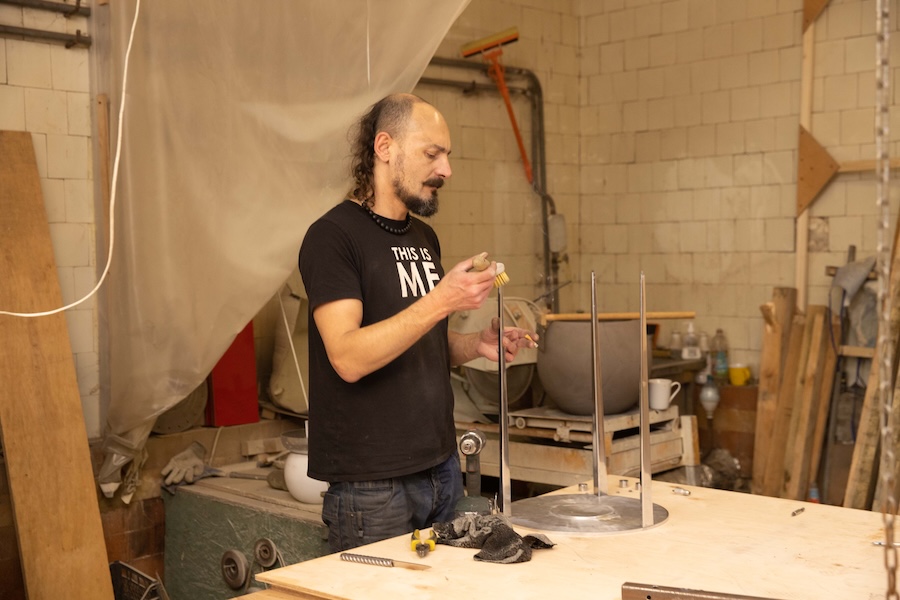
S: What do you value most in yourself?
Zh: I haven’t reached self-analysis yet. I think this analysis will happen when everything here is normal.
S: How do you see your future? How would you describe yourself?
Zh: I don’t see any future, like everyone who lives here. I live from exhibition to exhibition, from project to project. I need to complete the nearest project, and we’ll see after that. Here and now is my motto. People often ask: What about after the victory? I say: Which victory? when? Here and now. There is no “after the victory,” because it might not come soon, and it might not even be a victory.
S: You’re a bit of a pessimist.
Zh: I have too many friends at the front. I don’t read Telegram channels for our news. I get my news from other sources, so…
S: Do you think you are a complicated person? How would you characterise yourself?
Zh: Not really. I’m just a person, the same as everyone else. I know that in communication, I’m not a complicated person.
S: What do you believe in the most?
Zh: A very general question. What do I believe in? I don’t know. I believe in some small things, good things. I try not to lose faith in people, even though sometimes it’s hard. I continue to believe in them.
S: What would you say about Ukraine in three words?
Zh: Glory to the Heroes! Glory to Ukraine! There’s so much more to say. I’m grateful to the people who made it possible for us to be here today, in my studio, and for me to continue my work.
